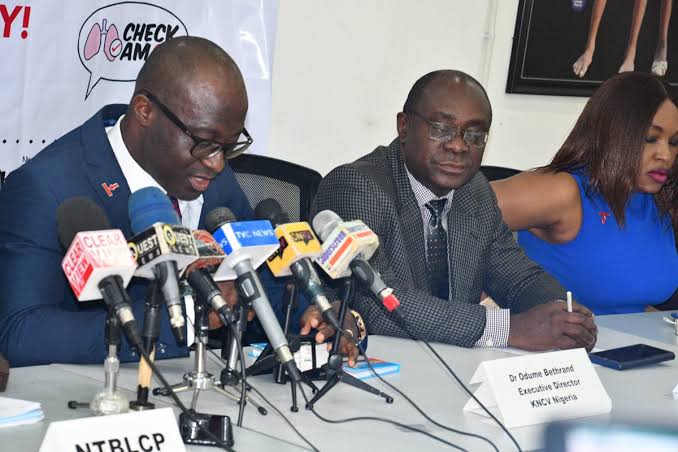… as Reps pledge to purchase diagnostic equipments for constituencies
By Regina Otokpa
Ahead of the 2020 World Tuberculosis Day, experts in the sector have expressed fears that Nigeria may not be able to meet the 2030 target to end Tuberculosis (TB) in the country, unless government at all levels intensify efforts.
Speaking to newsmen on Tuesday in Abuja, the National Professional Officer in charge of Tuberculosis at the World Health Organisation (WHO), Dr Ayodele Awe, raised concerns that despite the high fatality rate of Tuberculosis, the number one infectious killer in the world, there was still a huge funding gap of $157 million to raise advocacy and increase the coverage of TB services in the country.
Awe who disclosed that Nigeria detected 120,000 cases of Tuberculosis in 2018, the highest recorded so far in the last ten years, raised concerns that there was need to track and detect the remaining 300,000 cases who were a risk to transmitting the disease to unsuspecting persons.
In his words: “We have the highest burden in Africa, we are suppose to detect 429,000 each year, last year was the greatest number that has ever been detected over the ten years; we were able to detect 120,000 cases.
“Where are the 300,000 cases that are still coughing? Every undetected Tuberculosis case can spread the disease to 15 persons in a year. Multiply that with how many we have each year.
“There are free drugs everywhere, the target elimination for Tuberculosis is 2030, this is 2020 the progress we are making is not enough.
“The total number of funds needed for Tuberculosis each year is $278 million dollars, we are having only 8 percent as domestic there is a huge gap of $157 million gap that was suppose to help us for advocacy, for increasing service coverage.
Awe who doubles as Acting board chairman Stop TB Partnership, added that, “Tuberculosis is transmitted innocently, government needs to look at this infectious disease, every body is prone to Tuberculosis.”
The Chairman House Committee on Tuberculosis, HIV/AIDS and Malaria, Abubakar Dajiru, who said there would be an increased legislative engagement on TB with a view to reducing the scourge, pledged that each legislator would purchase a tuberculosis-testing machine, called Gene Xpert machine, for their constituency.
“In the coming week, you will see debate on tuberculosis because of the serious attachment we have for the health sector. And after this debate, I assure you that each member will buy the tuberculosis testing machines.”
Speaking on the poor budget release to the health sector, Dahiru blamed the budget office for not releasing enough money to the health sector to tackle various challenges.
He however assured that the house was working assiduously to ensure adequate release of funds for the health sector.
The Executive Director KNCV Tuberculosis Foundation, Dr. Odume Bethrand who raised concerns over the health threat of drug resistant TB, stressed on the need to continuously put TB on the political agenda as well as build a multi stakeholder partnership to address the socio economic impact of the disease on individuals and the country as a whole.
“We call on our political leaders to invest more on TB control, the civil society to continue to call for accountability and the media to always help in creating the needed awareness. It is a call to scale up; research, funding, human rights and accountability to end TB in Nigeria.”
On her part, the TB team lead, United States Agency for international Development (USAID) Temitope Odusote, said there was need to adopt a multi sectoral to ensure Nigeria meets up with the 2020 target to end TB in the country.
Odusote who stressed on the need for at least one Gene Expert machine in each local government area, said it was no longer enough to build clinics with the hope people would troop in and seek health care to treat TB at no cost.
“We are seeing the end of the target in sight, we want to focus more on multi sectoral collaboration for TB. We have all forms of healthcare practitioners in Nigeria its important we reach out to them including the orthodox medical doctors. We have to work with the executive, legislature, politicians, all those people who go into the grassroots. We have to reach out to corporate organisations, and other sectors.
The Director Institute of Human Virology Nigeria (IHVN), Dr Ronke Agbaje who disclosed there was an expansion of TB treatment and services to 12, 254 health care facilities both private and public, however lamented that only 40 percent of the local government areas have gotten the Gene Expert machines.
“Right now we have 399 Gene Expert machines all over Nigeria. We know Nigeria is big and our aspiration is to have one per local government. Right now we have about 40% of our local government covered. However there is a lot of efforts in place by all our donor partners and the government to increase this number so that we can get to the universal health care coverage.”






























